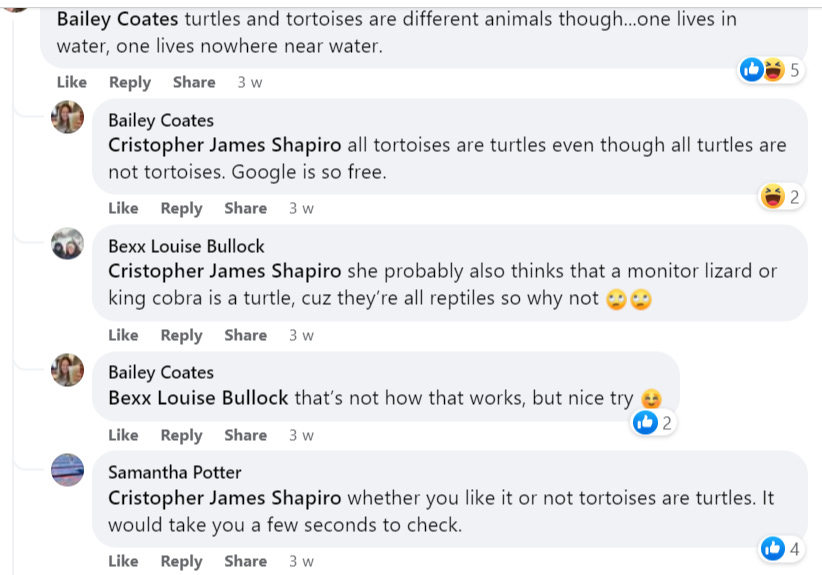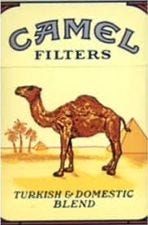Of Tortoises and Turtles
I recently got drawn into an argument in a Facebook group about tortoises and turtles. This is the kind of thing I enjoy arguing about and one of the reasons I prefer Facebook to Twitter, which I left after getting into too many arguments about things that seemed to actually matter. Not that the distinction between a tortoise and a turtle is entirely inconsequential. That particular difference may not matter much outside the worlds of herpetologists and people who like to keep reptiles as pets, but how we go about classifying things in general is of great importance.

The tortoise/turtle argument was actually a spinoff from an argument about whether dromedaries were camels, which eventually arrived at a consensus that a dromedary is a kind of camel, and that’s that, unless you really want to rename the famous cigarettes “Dromedaries”.
With tortoises and turtles, though two factors come into play: language varieties and folk vs. expert categories.
At a certain point in its history, a dialect may get promoted to a language variety. The sociolinguist Max Weinreich quipped that “a language is a dialect with an army and a navy”. When the unruly colonists in a part of North America broke away from the motherland, the dialect of English they spoke should by this rule have been promoted to being a language were it not for the fact that it was still called English, and it wasn’t very different from the variety of English spoken in England. Thus was American English born as a “language variety” — more official than a dialect, but not different enough to count as a language.
Speakers of British and American English often butt heads because the former often think (mistakenly) that their English is correct because it’s the original version, and the latter are often oblivious to other varieties of English, even if they are aware that British people call “pants”, “trousers”, which is awfully quaint. Somewhat to my surprise, few in the raging tortoise debate seemed aware that they were talking to speakers of a different variety of English, and the majority preferred to accuse the others of ignorance because everyone knows that tortoises are/aren’t turtles. Just to clarify: most Americans regard tortoises as a kind of land-dwelling turtle (if they use the word at all) while most Brits regard them as two entirely different animals.
Now this goes beyond pants vs. trousers or elevators vs. lifts because people on different sides of the Atlantic are not just using different words for the same category of things; they are categorising differently. You could take the relaxed view that “turtle” just means different things in the US and the UK — and most reasonable people would — but you could also take the view that British people are actually ignorant of the true nature of these reptiles. That sounds silly, but think of a language that classifies dolphins as fish (as some do). Is it simply because they define “fish” as anything that swims in the sea, or are they unaware that dolphins are mammals? Probably they aren’t anymore, but they may have been back when the language was evolving, and that may still affect the way they look at dolphins or whales, particularly when it’s dinnertime.
This brings us to the second distinction, which is between folk categories and expert categories. These are terms used in cognitive linguistics to describe the way experts in a subject may sometimes slice up the world in a different way from the rest of us. A popular example is “hacking”, which for most people means breaking into computer systems, but for programmers just means messing around with code, usually in productive ways. The first is a folk category; the second, an expert category. I am not expert enough to pronounce with certainty, but my guess is that seeing tortoises as a type of turtle is an example of expert categorisation because ordinary speakers of American English don’t use the word “tortoise” much, while ordinary speakers of British English regard tortoises as completely separate from turtles. And just to complicate matters further, in Australia, which does not have land-dwelling members of the Testudinidae family, the word “tortoise” is applied to freshwater turtles, much to the disapproval of experts — even Australian experts.
There is a tendency to regard expert categories as somehow more “correct” than folk categories, as was demonstrated in the Facebook exchange by people quoting scientific authorities, or at least screenshotting Wikipedia. Even when a word has existed for centuries in the Common Speech, people will sometimes tell you that you’re misusing it simply because some group of specialists use it differently; I recently witnessed a Twitter exchange where someone was berated for using “anxiety” to mean a state of extreme but not pathological worry when it was “really” a mental illness.
Linguists — who let’s face it are the experts here — don’t like this assumption. Whether we’re defining words or putting them into grammatical forms, what is “correct” is only correct within the context of a certain “speech community”. This means that sometimes the expert category is appropriate, and sometimes the folk category is. From a linguistic point of view, then, it is correct to refer to a tortoise as a turtle even in Britain, but only if you are talking with a bunch of herpetologists; otherwise, it’s wrong (or “infelicitous”, as linguists like to say).
The interesting question is not whether a tortoise is a turtle, but why people get so worked up about it. People get dogmatic and even angry about categories because categories are how we make sense of the world. We like to think that the boundaries we draw between categories reflect real discontinuities in the world, and some people will resist any attempt to redraw them. Consider this question:
If you call a tail a leg, how many legs does a dog have?
If your answer is “five”, you’re either pretty comfortable with linguistic relativism or you just weren’t thinking very carefully. If your answer is “four, because calling a tail a leg doesn’t make it a leg,” you may incline more to the view that categories are laid down by nature, and it is up to us to name them correctly. Both views have something to be said for them. Categories have to reflect the way the world is to some degree; otherwise, they would have been weeded out by linguistic natural selection. On the other hand, it’s naive to think that there is only one way to categorise the world. We would do well to remember this because if people can get that upset about turtles and tortoises, there’s no telling how furious they can get about some other categories. We would do well to remember that how we argue about whether a transwoman is “really” a woman or whether a Mexican is “really” an American is not that different from how we argue about whether a tortoise is a turtle or a dromedary is a camel.



